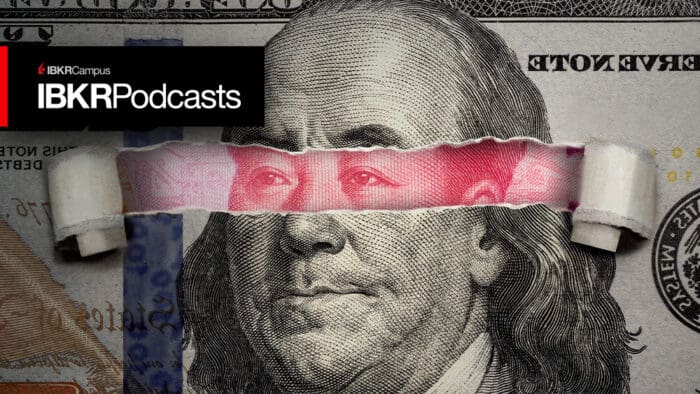CEO of IBKR Singapore’s Yujun Lin chats with Geoff Howie, a familiar voice in Singapore, as he provides insights on Asian markets’ reactions to the FOMC meeting, shedding light on banking sector performance and shifting market focus towards US economic resilience.
Delving into China’s growth and Japan’s monetary policies, the discussion navigates through inflation’s impact on commodities, spotlighting Singapore’s digital economy prowess amidst banking sector achievements.
Summary – IBKR Podcasts Ep. 160
The following is a summary of a live audio recording and may contain errors in spelling or grammar. Although IBKR has edited for clarity no material changes have been made.
Yujun Lin
Thank you very much once again for joining us. My name is Yujun. I am the CEO of Interactive Brokers Singapore. With me is Geoff Howie. Pretty famous in Singapore. He’s always on the local radio channels and also most recently on CNBC where he has made many appearances.
So Geoff, you are here today to tell us more about the APAC and Singapore economy. And I guess the first question on top of my mind, on top of everybody’s mind is what are your main observations on how the Asian markets have reacted to yesterday’s FOMC meeting?
Geoff Howie
Hi Yujun. It was business as usual. Very mixed across the board. Hang Seng Index (HSI) was actually the stronger performer across APEC today. And then on the other side of the coin, you had Taiwan and Philippines, the laggards. So there was no kind of broad reaction that was represented in some sort of pattern of selling or buying per se.
But within the sectors, we did note that banks were stronger here in Singapore, but that might have also coincided with the fact that the biggest bank in Singapore reported its first quarter numbers before the open. Why I say it was also business as usual is because that decision to keep rates on hold: It was already priced into the market, obviously, as was that decision to reduce the pace of the quantitative tightening program. That had been signaled, remember, back on the FOMC on the 20th of March. And during April we saw Global, including Asia, markets increasingly price in a reduced quantum, if you will, of Fed Funds rate cuts in the second half of this year.
And I think majority expectations have been reduced to expectations for a 25 BPS cut versus a 75 BPS cut that we thought would happen at the beginning of April. And this is obviously all in the second half. I think odds for rates to remain unchanged by the end of the year also picked up a little bit to around 25% during April. And that’s based of course on the CME FedWatch tool.
Coming into this year basic modelling always suggested that there was going to be a risk that the Fed’s preferred gauge for inflation, the PCA core deflator, would level out sub 3%, rather than continue that downward gradient that we saw last year. And the extrapolations, while they didn’t show much risk of inflation returning back to higher levels, you can’t fully discount risks that obviously come from energy, food and potentially tighter labor markets.
But I guess if we were to sum up how it worked, you look at FTSE EPRA Nareit Global REITsindex, okay? That’s 70% US REITs. That essentially ended very close to flat last night after the Fed decision, but it was after a 6% decline in total return in April.
So there you can see most of what actually occurred at the 1st of May FOMC was priced in in April. In Singapore, our IHS REIT index declined by a little bit more, so it wasn’t so flat. It maybe declined a little bit more in the morning session, but it only saw half the declines of the Global FTSE EPRA Nareit Global REITs Index during April.
But the one thing that I wanted to kind of stress is that what’s become increasingly apparent in April, particularly here in Asia when we’re looking at the US, is that market focus is very much morphing from that “if” or the “when” or the “quantum” of Fed fund rate cuts to the exact extentof the potential of the smooth landing in the US economy.
Yujun Lin
Well, thanks for that. Yeah, I think that’s a very good summary. Like you said, I think the market is probably looking at higher or the same for longer, right? And I suppose the question is for how long will this persist? And as long as inflation remains high, rate cuts would be less probable, right?
Moving on from rate cuts, I guess in APAC, China is a big influence. Other than the US. And now with China growth pretty much above initial expectations and Japanese Yen continues to be extremely weak, how do you think these two large economies in Asia have affected APAC?
Geoff Howie
Well, for China, the higher than expected growth we’ve seen recently has been well received, as has the renewed strategic direction and, of course, execution of those structural initiatives. And of course the moderate expansion monetary policy in China supports that.
But there’s, I guess, at the moment three very key themes for China and market implications that come from those themes.
The first is the impact of the new quality productive forces doctrine and the pursuit, I guess, of industrial modernization, digitalization and sustainable development. So you’ve got that as the first, I guess, key theme for China watchers and investors at the moment.
The second is the ongoing impact of the CSRC market stabilization measures. And then thirdly, their continued gradual slowing of the China housing market into 2026.
So they’re three key areas and I could easily spend 15 minutes on each of them. Is there one of those three you wanted me to look at a little bit more?
Yujun Lin
The China housing situation has been, I suppose, top of mind for a long time. Would you say that that has mainly also been priced in since it seems to have stabilized a little bit?
Geoff Howie
Yes, stabilized and also expectations have basically aligned with what a lot of the leading think tanks around the world are saying. Real estate investment in China is actually expected to continue multi-year declines through to 2026.
So that means your key property market needs structural solutions. And the IMF that have done a lot of research on this and project that 2026 eventual start of recovery based on other slowdowns in property markets across the world that have similar scale, they identify five key steps for a road map to recovery.
This gives investors key milestones and key beachheads to watch out for. The first is obviously the measures to accelerate the exit of non-viable developers. The second is the removal of impediments to the housing price adjustments, which when you pull it up on Bloomberg or Icon, you can see doesn’t really move too much. There’s a lot of rigidity there.
The third is the allocation of additional central government funding for housing completion. And the fourth, assistance to the viable developers to repair their balance sheets and help them adapt to the smaller property market.
And the fifth one is one of the more intricate ones because you’re looking at central government implementing a coordinated, fiscal framework reform system that can include balance sheet restructuring to address those local government debt strains, closing local government fiscal gaps, controlling the flow of debt and of course looking to restructure or reduce, rather, the debt level from the local government financing vehicles.
And you also asked about Japan, right? So the initial cautious steps of the BHA monetary policy obviously stands to support Japan’s mega banks and the broader consumer spending there as well.
And moderate inflation, if that continues to be continuing into the medium term, then you can also see some impact on consumer spending, saving and investment dynamics as well.
But you’ve had a very modest change in policy. So you’ve also seen the Yen slip to the U.S. dollar. And this week, you’ve seen a lot of speculation and conjecture that the Bank of Japan has obviously been intervening on its Yen. Seems to be reversing pretty quickly from the 160 level down to around 155. First on Monday and then again last night. Yeah. In the U.S. trading session.
Yujun Lin
Potential intervention, as has been talked about a lot.
Geoff Howie
Yeah.
Yujun Lin
Do you think this can potentially put upward pressure on Japanese interest rates?
Geoff Howie
I think it’s important, but at the same time there’s a lot of other areas to look at. Rating agencies, if you will, when they’re looking at Japan’s stock market and segments, they’re looking for stable inflation in Japan, accompanied by moderate wage increases to actually underpin that consumer and sustain the economic growth.
But you need to improve macroeconomic outlook as well. We’re obviously going through a repricing, if you will, on what’s happening in the U.S. dollar. and the US economy, particularly the month of April as I said, the world’s adapting to the fact that you’re going to have less rate cuts.
But at the same time, there’s potential for U.S. economic growth to be achieved at a point where you’ve got a smooth landing. And the question is just how smooth it is. It’s going to be really interesting.
Yujun Lin
Absolutely. I think the US economy is always that trillion-dollar question, right? How smooth it will land, yeah.
Geoff Howie
The Bank of Japan Minutes were out today from not the recent meeting, but the one before back in March, and there wasn’t very much talk about the intervention at that point. So I think we have to wait for the April Minutes to come through and then we’ll get a lot more clarity on what they’re thinking.
Yujun Lin
So moving on very quickly, I think let’s talk about sticky inflation affecting most global economies, including price of oil, about which much has been said. How would you say that inflation and also political tensions have affected the price of commodities like gold? And what about commodities, you know, very much at APAC nexus like iron ore, rubber?
Geoff Howie
Yeah, exactly. Gold’s a really important part of our ETF market. And that product has traded quite significantly in April, in terms of increased trader participation and also obviously outpaced APAC markets, our STI and so forth since the end of 2019. Because the geopolitical tensions, whether it’s in Eastern Europe, whether it’s in the Middle East or across the Pacific in terms of trade tensions and so forth. This has been a familiar trend for some time.
And the gold has seemed to play out as the go-to market. Now, Securities products. But at the same time, we’ve also got derivatives in the commodity markets. Iron ore, rubber and dairy. They’re among our most traded commodity derivatives here, together with forward freight agreement derivatives.
So they make up the majority of commodity trading volumes. For the commodity volumes, Iron ore presently makes up about 90% of volume, rubber makes up 6% and then dairy 1%. And then FFA I think is in the middle, at about 3%. Thereabouts.
But iron ore also has its own drivers. It’s a key input for steel production, has demand from property infrastructure, manufacturing sectors and ranks as the second largest commodity by weight and value in the world behind crude oil.
But like all commodity classes, and there’s a great IMF paper recently released on this, it just shows you they’ve all been more volatile since 2019 compared to the entire preceding thirtyyears.
Yujun Lin
A sign of the times.
Geoff Howie
Yeah, it’s definitely a sign of the times. Iron ores ranked as one of the best performing global commodity classes since China obviously reopened at the back end of 2022. You’ve also had these consistent roll returns, particularly last year.
That was due to the persistent backwardation in the iron ore forward curve. It’s basically because you’ve got stronger demand for the front mumps and subsequent premiums to the forwards. And that creates this positive roll yield for long positions, with yields reaching, I think, as high as above 20% last year.
That’s obviously helped attract a diverse range of market participants. CTAs, prop trading groups, hedge funds, index trackers and asset managers and all sorts. So it’s interesting.
While we’ve got increased financial participation, upstream iron ore, it’s not immune to rising costs that we’re seeing in the corporate world here. Higher inflation and certain production costs.
Because of that, one of our listed companies, Fortress Minerals, reported that for its full year, which ended in February, its average selling price was $98/ dry metric ton versus an average unit cost of $34 for wet metric tons.
And that compared to a wider margin with unit costs, I think lower at $26 in FY23. So producers across the globe are also able to utilize the Iron Ore Futures to obviously hedge their rising costs, falling margins and so forth.
The rubber market.. I think more than 70% of natural rubber is used in tire manufacturing. We actually provide that pricing benchmark for physical rubber in the TSR20 Asia Rubber Futures.
This has also been on the move somewhat. I think it’s moved from around $1.60/kilo the beginning of the year to $1.80/kilo in mid-March. And then its daily volume I think is currently around 14,000 lots. So TSR is the technically specified rubber. It’s like a liquid latex which is allowed to congeal naturally.
They form it into blocks and that’s therefore then gone and used for tire manufacturing.
So those moves in March, $1.60 up to $1.80 in mid-March coincided with the news that EV export growth in China was booming. And March had seen record high in EV exports from China. So that’s another interesting dynamic in terms of our commodity derivatives really being impacted by, obviously, Asia’s largest economy.
Yujun Lin
Yeah, absolutely fascinating. And I think each of these markets are pretty esoteric and I think we can go into great detail about them. But perhaps in the future days.
So I think we have time for one very quick question.
So you mentioned earlier that one of our largest banks in Singapore announced, I think record profits. And Singapore generally being a very digital economy and that bank being a very digital bank, what would you say would be new from the finance sector and the digital sector in 2024, this year, for Singapore?
Geoff Howie
One thing I would like to relay is we’re actually really big in exports of digital delivered services. We rank again and the rankings only just came out last month by WTO as the 8th. That’s number eight largest global exporter of digitally delivered services.
We have 4.3% of the global share, Yujun, and that’s for an economy that’s 0.4% of global GDP. We’re set to become a $1 trillion Internet economy across Southeast Asia by 2030. And this digitalization is playing a key role in the productivity of the banks.
It’s not without its challenges. In fact, we had some outage of services from DBS this evening for a couple of hours thereabouts. There were some online transactions. I couldn’t run it, but this is part of the new world in terms of the digital services and the reliance on technology becoming such an important part of our lives.
And this stock actually reported today. And you know what it did? This is the stock, the first one I’ve seen that actually has reached as of the close today, a market value of 100 billion Singapore dollars. So it’s reported, yeah, as we said, record net profit.
As Singapore’s biggest stock, it’s also paralleling what we’re seeing in our economy, in that our advanced first quarter GDP result showed that there was broadening growth in Singapore. And DBS highlighted today, it’s all brought more broad-based business momentum with the loan growth, record fee income, as well as the Treasury customer sales.
So this stock has been a big part of leading the STI, in terms of its performance this year and since the end of 2019.
Yujun Lin
OK. Thanks for that, Geoff. I think that’s all the time we have today for the APAC update. And I think we managed to spend quite a bit of time talking about inflation, the FOMC, big regional economies and also Singapore, which I’m very glad to hear that we’re still punching above our weight.
So anyway, thank you once again, Geoff Howie, for your time. This is Yujun from Interactive Brokers. Geoff Howie, SGX Senior Economist.
We will be back with more episodes in the future. Thank you.
Disclosure: Interactive Brokers
The analysis in this material is provided for information only and is not and should not be construed as an offer to sell or the solicitation of an offer to buy any security. To the extent that this material discusses general market activity, industry or sector trends or other broad-based economic or political conditions, it should not be construed as research or investment advice. To the extent that it includes references to specific securities, commodities, currencies, or other instruments, those references do not constitute a recommendation by IBKR to buy, sell or hold such investments. This material does not and is not intended to take into account the particular financial conditions, investment objectives or requirements of individual customers. Before acting on this material, you should consider whether it is suitable for your particular circumstances and, as necessary, seek professional advice.
The views and opinions expressed herein are those of the author and do not necessarily reflect the views of Interactive Brokers, its affiliates, or its employees.
Disclosure: Futures Trading
Futures are not suitable for all investors. The amount you may lose may be greater than your initial investment. Before trading futures, please read the CFTC Risk Disclosure. A copy and additional information are available at ibkr.com.
Disclosure: ETFs
Any discussion or mention of an ETF is not to be construed as recommendation, promotion or solicitation. All investors should review and consider associated investment risks, charges and expenses of the investment company or fund prior to investing. Before acting on this material, you should consider whether it is suitable for your particular circumstances and, as necessary, seek professional advice.

















Join The Conversation
For specific platform feedback and suggestions, please submit it directly to our team using these instructions.
If you have an account-specific question or concern, please reach out to Client Services.
We encourage you to look through our FAQs before posting. Your question may already be covered!